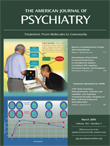Dysbindin Genotype and Negative Symptoms in Schizophrenia
Abstract
OBJECTIVE: Converging evidence has demonstrated an association between variants in the dysbindin gene (DTNBP1) and schizophrenia. Recently, a DTNBP1 risk haplotype, associated with both schizophrenia and neurocognitive dysfunction, has been identified. Because neurocognitive dysfunction is commonly accompanied by negative symptoms (avolition, alogia, and affective flattening) in schizophrenia, the authors hypothesized that the presence of the risk haplotype would be significantly associated with negative symptoms. METHOD: The authors tested for an association between a DTNBP1 risk haplotype and a lifetime history of negative symptoms in 181 Caucasian patients with schizophrenia. RESULTS: A significant association was found between the presence of the risk haplotype and negative symptoms. CONCLUSIONS: These data suggest that the effect of DTNBP1 genetic variation may be associated with negative symptoms in patients with schizophrenia.



